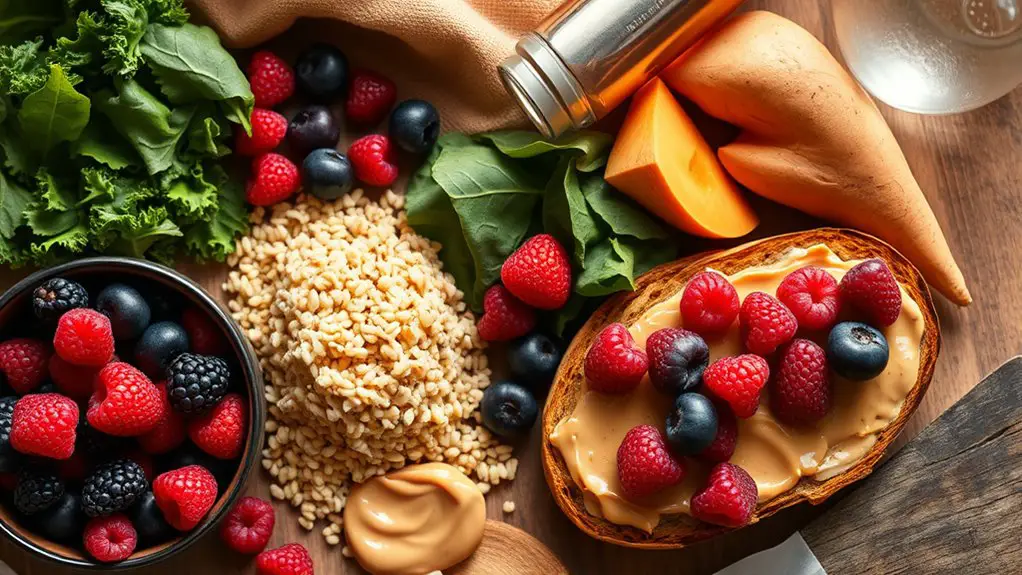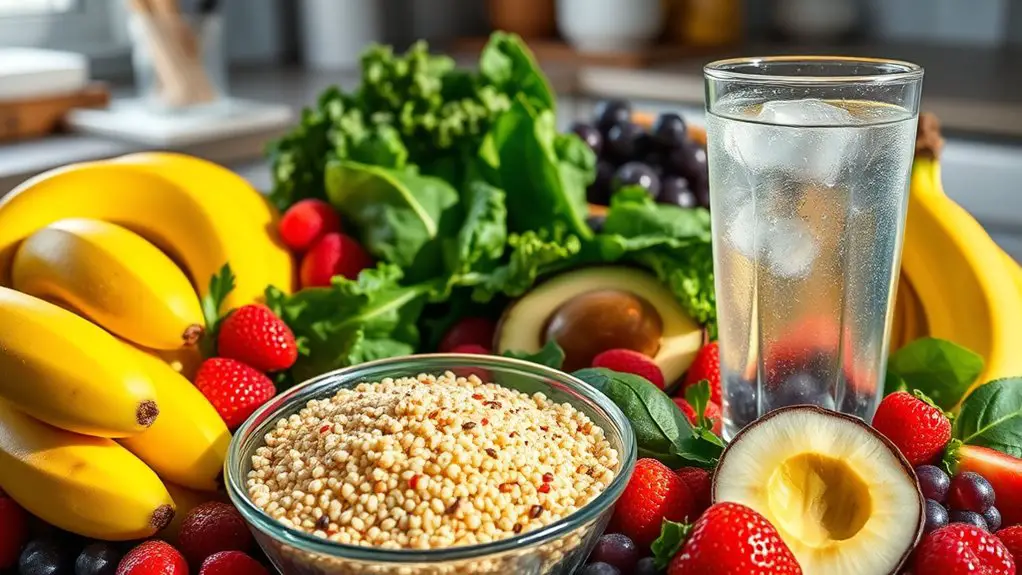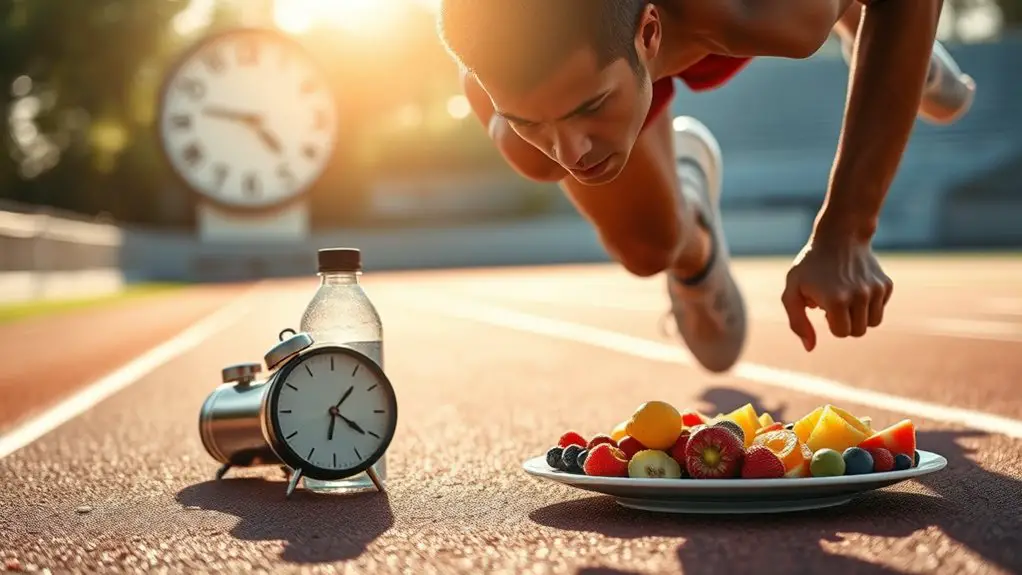To fuel your body for endurance sports, focus on a balanced intake of carbohydrates, proteins, and fats. Eat a meal 2-3 hours before your workout, incorporating complex carbs and lean proteins. Stay hydrated by drinking water consistently and consume quick energy sources like gels or bananas during your event. Post-workout, prioritize protein and carbs for recovery. With the right nutrition strategies, you'll optimize your performance. There's more to explore for a tailored plan that suits your needs.
Understanding Macronutrients for Endurance
When you're gearing up for endurance sports, understanding macronutrients is essential, as they play an important role in your performance and recovery. You've got three main types: carbohydrates, proteins, and fats. Carbs are your primary fuel source, giving you the energy to push through long sessions. Don't underestimate proteins; they help repair muscles and keep you strong. Fats are crucial too, providing sustained energy for those longer, slower efforts. Balancing these macronutrients lets you enjoy the freedom of movement, helping you conquer long distances without feeling bogged down. Focus on what works for your body—everyone's different. By tuning into your nutritional needs, you can fuel your passion and embrace every moment of your endurance journey.
Pre-Workout Nutrition: What to Eat and When
Timing your pre-workout nutrition can make a significant difference in your performance. Aim to eat a balanced meal 2-3 hours before your workout, focusing on complex carbohydrates, lean proteins, and healthy fats. This helps fuel your body without weighing you down. If you're short on time, a snack about 30-60 minutes prior, like a banana with nut butter or a smoothie, can provide that quick energy boost you need. Remember, everyone's body reacts differently, so it's important to experiment and find what works for you. Trust your instincts and listen to your body. With the right pre-workout fuel, you'll feel more energized and ready to push your limits and embrace the freedom of movement.
Hydration Strategies for Optimal Performance
You've fueled your body with the right pre-workout nutrition, but hydration plays an equally important role in your performance. Staying hydrated lets you chase your freedom in every stride and pedal stroke. Aim to drink water consistently throughout your training. Here's a simple hydration strategy you can follow:
| Time Before Activity | Suggested Hydration |
|---|---|
| 2-3 hours | 16-20 ounces |
| 30 minutes | 8-10 ounces |
| During activity | 7-10 ounces every 20 minutes |
These guidelines help maintain your fluid levels, preventing fatigue and enhancing your endurance. Remember, a well-hydrated body is a powerful ally on your journey to freedom, allowing you to conquer your goals with confidence!
Fueling During Your Endurance Event
As your endurance event unfolds, fueling becomes essential for maintaining energy levels and optimizing performance. You don't want to hit that dreaded wall, so focus on quick sources of energy. Here are some top options to evaluate during your event:
- Energy gels: Easy to carry and digest, providing a quick carbohydrate boost.
- Sports drinks: Hydration and electrolytes in one sip to keep you refreshed.
- Bananas: Nature's fast fuel, packed with carbs and potassium for muscle function.
- Nut butter packets: A tasty, satisfying option for sustained energy, with healthy fats.
Experiment with these during training to find what works best for you. Fuel wisely, and enjoy the freedom of your endurance journey!
Post-Workout Recovery: Nutrients for Healing
After pushing your limits in an endurance event, focusing on post-workout recovery is essential for healing and replenishing your body. The right nutrients can make all the difference. Start with protein—it's vital for muscle repair. Aim for a mix of fast-acting sources, like whey or plant-based options, within 30 minutes after your effort. Don't forget carbohydrates; they'll help restore your energy levels, so grab a banana or a slice of whole-grain bread. Hydration is key, too; water or electrolyte drinks can keep you balanced. Finally, consider antioxidants from fruits like berries or leafy greens to combat inflammation. By giving your body what it needs, you'll feel more energized and ready for your next adventure.
Timing Your Meals Around Training Sessions
To maximize your performance during endurance training, it's crucial to time your meals effectively around your workout sessions. Eating at the right times can fuel your body and enhance your training experience. Here are some tips to keep in mind:
- Pre-workout: Eat a balanced meal 3-4 hours before training, rich in carbs and protein.
- Snack: If you're short on time, grab a light snack 30-60 minutes prior, like a banana or energy bar.
- Post-workout: Refuel with a meal or snack within 30 minutes after training, focusing on protein and carbs to promote recovery.
- Hydration: Don't forget to stay hydrated; drink water before, during, and after your workouts to keep your energy up.
Timing's key to your success and freedom in endurance sports!
The Role of Supplements in Endurance Sports
While proper nutrition forms the foundation of endurance performance, supplements can play a significant role in enhancing your athletic capabilities. They can help fill nutritional gaps and boost your energy levels, allowing you to push through those long training sessions. Key supplements like electrolytes, amino acids, and beta-alanine can improve hydration, reduce fatigue, and enhance muscle recovery. Just remember, they're not a replacement for a balanced diet but rather a complement to it. You've got the freedom to experiment and find what works best for you. Always listen to your body and adjust accordingly. With the right mix of whole foods and targeted supplements, you'll be better equipped to tackle those endurance challenges ahead. Your journey, your choice!
Personalizing Your Nutrition Plan for Success
When it comes to optimizing your performance, personalizing your nutrition plan is essential for success in endurance sports. You need to understand your unique body's needs, as everyone's nutritional requirements differ. Here are some key factors to take into account:
Personalizing your nutrition plan is crucial for enhancing performance in endurance sports, as individual needs vary significantly.
- Macronutrient Ratios: Tailor your carbs, proteins, and fats based on your training intensity.
- Hydration: Stay properly hydrated, adjusting fluid intake for climate and workout duration.
- Timing: Fuel before, during, and after your workouts to maximize energy and recovery.
- Food Preferences: Incorporate foods you love to make your nutrition plan enjoyable and sustainable.
Frequently Asked Questions
How Do I Know if I'm Eating Enough for Endurance Training?
You'll know you're eating enough if you feel energized during workouts, recover quickly, and maintain a steady weight. Listen to your body; hunger cues and performance dips are signs it's time to adjust your intake.
Can Caffeine Enhance My Endurance Performance?
Studies show caffeine can boost endurance by up to 12%. Just imagine running freely, pushing through fatigue with that extra energy. It's like having a secret weapon, helping you conquer those long training sessions.
Should I Avoid Fat Before Endurance Events?
You don't need to completely avoid fat before endurance events. In moderation, healthy fats can provide lasting energy. Just be mindful of timing and choose easily digestible options to prevent any discomfort during your performance.
How Do I Adjust My Nutrition for Altitude Training?
When you're altitude training, you'll need to increase your carbohydrate intake and stay well-hydrated. Don't forget to monitor your body's response and adjust as necessary; it's all about finding what works best for you.
What Are the Best Snacks for Endurance Athletes On-The-Go?
For on-the-go endurance snacks, you'll want nutrient-dense options. Think trail mix, energy bars, or fruit. These'll keep your energy up without weighing you down, so you can focus on your adventure, not your hunger.




